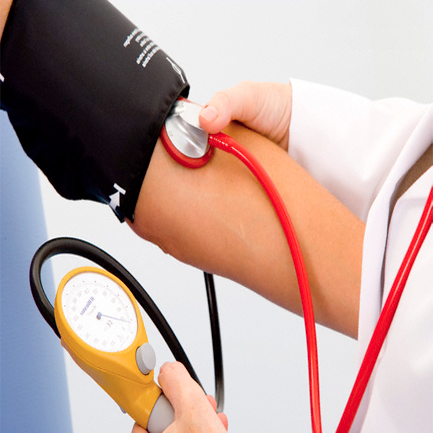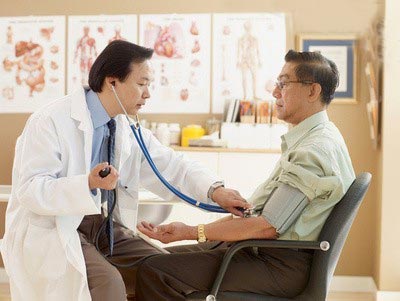If you have high blood values, it also can not confirm that you have high blood pressure. The diagnosis of this disease should be regularly monitored with a doctor or health center. For older people, if the index is 140/90 or higher, it is determined to be high blood pressure. However, those with kidney disease, diabetes, or obesity, then the index will be lower: 130/80

The cause of hypertension
In 10% of cases of hypertension are caused by another disease (secondary hypertension). In this case, when the disease is cured, the blood pressure usually returns to normal. Causes of secondary hypertension include:
- Chronic kidney disease
- U or other diseases of the adrenal glands.
- Congenital aortic stenosis - can cause high blood pressure in the arm.
- Pregnancy.
- Use of oral contraceptives.
- Alcoholism.
- Diseases of the thyroid gland.
- U or other diseases of the adrenal glands.
- Congenital aortic stenosis - can cause high blood pressure in the arm.
- Pregnancy.
- Use of oral contraceptives.
- Alcoholism.
- Diseases of the thyroid gland.
The remaining 90% of cases the cause is not found (called primary hypertension). Although the cause is unknown but it is also recognized by a number of factors may contribute to hypertension
- Age: the older you are, the more prone to high blood pressure,
especially systolic blood pressure, because the arteries become stiffer,
the disease is caused by arteriosclerosis.
- Socio-economic Status: hypertension
- Also were more in the group who have educational qualifications and low socio-economic.
- Family history (genetics): hypertension tend to be inherited in families.
- Gender: Men often prone to high blood pressure than women. This varies according to age and race
- Overweight (obese): Obese people are at risk for high blood pressure higher than 2 to 6 times the weight in the normal range.
- Sensitive Sodium (salt): some people are sensitive to sodium (salt) so their blood pressure will rise if the salt.
- Socio-economic Status: hypertension
- Also were more in the group who have educational qualifications and low socio-economic.
- Family history (genetics): hypertension tend to be inherited in families.
- Gender: Men often prone to high blood pressure than women. This varies according to age and race
- Overweight (obese): Obese people are at risk for high blood pressure higher than 2 to 6 times the weight in the normal range.
- Sensitive Sodium (salt): some people are sensitive to sodium (salt) so their blood pressure will rise if the salt.
- Drink: drink more than 1 or 2 glasses of wine one day can increase blood pressure for those who are sensitive to alcohol.
- The Pill (orally): some women taking oral contraceptives may have high blood pressure.
- No exercise: a place to sit much can cause obesity and hypertension.
- Medications: Some drugs, such as amphetamines (stimulants), diet pills, cold and allergy medications can increase blood pressure.
- The Pill (orally): some women taking oral contraceptives may have high blood pressure.
- No exercise: a place to sit much can cause obesity and hypertension.
- Medications: Some drugs, such as amphetamines (stimulants), diet pills, cold and allergy medications can increase blood pressure.

Expression
- Headache: The back of the neck or forehead, usually in the morning, sometimes lasting all day.
- Dizziness: Feeling unsteady on your feet and head slightly heavier.
- Tiredness: Feeling heavy in the chest, shortness of breath vapor.
- Weak paralyzed limbs few seconds to several minutes.
- Nosebleeds recurrent.
- Tinnitus, insomnia ...
- Dizziness: Feeling unsteady on your feet and head slightly heavier.
- Tiredness: Feeling heavy in the chest, shortness of breath vapor.
- Weak paralyzed limbs few seconds to several minutes.
- Nosebleeds recurrent.
- Tinnitus, insomnia ...


Không có nhận xét nào:
Đăng nhận xét